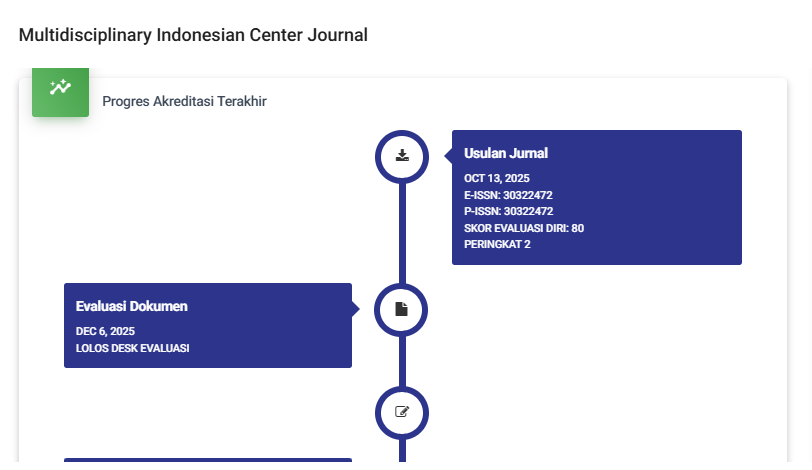THE RELATIONSHIP BETWEEN HEALTH LOCUS OF CONTROL AND DIET COMPLIANCE IN TYPE 2 DIABETES MELLITUS PATIENTS IN THE WORK AREA OF KABILA COMMUNITY HEALTH CENTER BONE BOLANGO REGENCY
DOI:
https://doi.org/10.62567/micjo.v2i3.803Keywords:
Diabetes Mellitus, Health locus of control, diet complianceAbstract
Diabetes mellitus is a disease characterized by increased glucose levels that over time cause serious damage to the heart, blood vessels, eyes and kidneys ( World Health Organization) in 2024. Compliance is the degree to which a person carries out health-related behavior, either taking medication, following diet therapy and changing lifestyle according to recommendations given by health workers. Diet or nutritional therapy is used to regulate the patient's food intake so that it remains fulfilled and does not result in an increase in blood sugar so that it is necessary to regulate the schedule, type and amount of food as nutrition. This study aims to determine whether there is a relationship between health locus of control and compliance with diet in patients with diabetes mellitus in the Kabila Health Center work area. The design in this study is quantitative correlational. The sampling technique in this study used the non-probability sampling method with a total sample of 52 diabetes mellitus participants at the Kabila Health Center. The instrument used in the study used a questionnaire instrument with open questions about the variable health locus of control and compliance with the diet of patients with diabetes mellitus. Based on the results of the study, there is a relationship between health locus of control and compliance with diet in diabetes mellitus patients in the Kabila Health Center work area, with a significance value or p-value showing 0.000 (p <0.05). This is based on the alternative Fisher exact test because there are 3 cells with an expect count value <5.
Downloads
References
Adhanty, S., Ayubi, D., & Anshari, D. (2021). The relationship between health locus of control and dietary compliance in patients with type 2 diabetes mellitus at Depok City Hospital in 2020. Health Behavior and Emotions: Indonesian Journal of Health Promotion and Behavior .
Ambarwati. (2024). Type 2 diabetes mellitus: Disease concept and management (D. Fanasi, Ed.). CV Perkasa Satu.
Aminah, S., Hartati, & Dita, NH (2021). Literature study of the relationship between dietary compliance and blood sugar levels in patients with type 2 diabetes mellitus. Journal of Nursing Media: Makassar Health Polytechnic, 12 (1), 4–5.
Article, O. (2023). Effect of distance education (telenursing) on reducing the anxiety of prostate cancer patients after chemotherapy: A semi-experimental study. Avicenna Journal of Nursing and Midwifery Care, 31 (4), 303–311.
Buston, E., Efendi, P., & Heriyanto, H. (2021). The effect of implementing the 4 pillars of diabetes mellitus management on nutritional status in diabetes mellitus patients at the Kandang Health Center, Bengkulu City. Aisyiyah General and Health Scientific Journal, 6 (1), 15–21.
Gorontalo District Health Office. (2024). Gorontalo District Health Office Profile 2024. Gorontalo: Gorontalo District Health Office.
Dogonchi, M., Mohammadzadeh, F., & Moshki, (2022). Investigating The Relationship between Health Locus of Control and Health Behaviors; A Systematic Review. The Open Public Health Journal, 15 (1). https://doi.org/10.2174/18749445-vl5-e2208010.
Ernawati et al. (2020). Factors Affecting the Level of Diet Compliance in Type 2 Diabetes Mellitus Patients in Sumbang District, Banyumas. Journal of Bionursing
Febrinasari, R., Sholikah, T., Pakha, D., & Putra, S. (2020). Diabetes mellitus pocket book for the layperson . Surakarta: UNS Press.
Hamzah, Akbar, H., Faisal, TM, Rafsanjani, Sartika, Sinaga, AH, Hidayani, WR, Agustiawan, Panma, Y., & Bela, SR (2021). Epidemiological theory of non-communicable diseases . Muhammad Zaini Publishing Foundation.
International Diabetes Federation. (2021). About diabetes . https://idf.org
Ministry of Health of the Republic of Indonesia. (2023). Indonesian Health Survey 2023 (SKI) . Ministry of Health.
Lestari, Z., Zulkarnain, & Sijid, SA (2021). Diabetes mellitus: Review of etiology, pathophysiology, symptoms, causes, examination methods, treatment methods and prevention methods. Proceedings of the National Biology Seminar, 7 (1), 237–241.
Mahaling, C. (2023). The effectiveness of health education through mobile phone-based telenursing on blood sugar levels of people with diabetes mellitus in Sangihe Islands Regency. Hasanuddin University Makassar.
Nursalam. (2020). Nursing science research methods: A practical approach (4th Edition). Jakarta: Salemba Medika.
Indonesian Endocrinology Society. (2019). Consensus on the management and prevention of type 2 diabetes mellitus in Indonesia . Jakarta: PERKENI.
Sari, F. (2021). The effect of diabetes mellitus self-management on the risk of complications in diabetes mellitus patients at the Siwalankerto Health Center, Surabaya City [Thesis published]. Hang Tuah Health Sciences College, Surabaya.
Sugiyono. (2023). Qualitative quantitative research methods (Sutopo, Ed.). ALPHABET.
Wahyudi, DA, Susanto, G., Nugroho, AS, Cahyani, DW, Nurrohmah, L., & Sholeha, S. (2024). Nursing interventions in diabetic ulcer patients . NEM Publisher.
World Health Organization. (2024). Diabetes . https://www.who.int
Downloads
Published
How to Cite
Issue
Section
License
Copyright (c) 2025 Citra Magfira Nihe

This work is licensed under a Creative Commons Attribution-ShareAlike 4.0 International License.



























